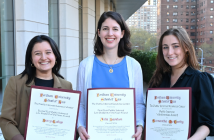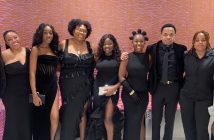The following are remarks given by Kenneth C. Frazier, executive chair of Merck & Co., after receiving the 2022 Fordham-Stein Prize:
I really want to thank all of you, because it is such a huge honor to be here with members of the judiciary, the Fordham University trustees, the faculty, past Stein Prize awardees, Fordham Law students and alumni, and Dean Feerick. All of you gathered this evening, I’m very honored by your presence. Standing before such a learned and accomplished audience as a recipient of the prestigious Fordham-Stein Prize is, for me, one of the greatest privileges and honors of my life.
I was born in 1954, just months after the landmark Brown v. Board of Education ruling that would have an immense impact on my life. I say that because, starting in grade school, I was bused from the inner city neighborhoods that I grew up in to better schools. When I think about my next oldest sibling, and my other siblings, and the children around my neighborhood, I realize that I did not earn that opportunity. I would not be standing in front of you tonight had I not been given a quality education—which was unavailable to children of parents who could not afford real estate that was proximate to where the good schools were in Philadelphia.
I grew up inspired by the Civil Rights Movement, because I knew that, but for people like Thurgood Marshall, and a man who was my personal mentor—you may know who Bill Coleman was, he actually received this award many years ago—those people fought to make the words that we all believe are our sacred creeds as a country real, not just for Black Americans, but also for other disadvantaged and marginalized Americans.
And so, when I graduated from law school, I left determined to seize the power of the law, to try to make changes on behalf of other people. I wanted my chance to help other people who came from underrepresented and disadvantaged communities.
And to this day, you know, people introduce me as the CEO of Merck. But what I’m most proud of are those cases where I had an opportunity to represent people on death row or to represent people who lived in substandard housing. We were able to bring affirmative litigation to get that housing to change. Lani Guinier and I had a case together which created a majority-minority district in the Philadelphia congressional area. Those are the cases that stay with me.
You know, the death penalty case, I tell people I actually had two, I had one for [the Legal Defense Fund]. I don’t talk about that [case]because I got it late. My client had good claims, I believe, but they were all defaulted. I couldn’t bring [the case to court]. I couldn’t get [those claims heard]. They were not cognizable in the federal court, and he was executed.
So, I talk about Bo Cochran because he was almost executed. His case was almost at a point where we couldn’t raise even the most fundamental issues. You know, in that case, if you assumed that the prosecution’s facts were correct, the crime [Cochran was accused of] was not eligible for the death penalty under the Alabama penal code. Some of you here taking Criminal Law right now, you would flunk that class if you wrote a Bluebook suggesting that that charge was appropriate in this case.
When I graduated from law school, I wanted to be optimistic about the future of this country and about our willingness to live up to these creeds, including “Equal Justice Under Law,” which, of course is engraved above the [entrance to the]Supreme Court. Right now in this country, we are incredibly divided. And we’re not capable of asking ourselves what the lessons of our history are.
Our history tells us a lot about what’s noble about this country. It also tells us a lot about the errors that we’ve made in the past. And I think that, when people say we can’t look at both, because “it will make us feel bad,” they’re treating us like we’re children. And I think it’s been shown in the past, that as Santayana said, those who don’t know their history are condemned to repeat it [sic].
I think it’s a very important time in this country. I think our democracy is on the knife’s edge right now. As I look at the rhetoric in our country, I scarcely remember when I came out of college in the 70s thinking that we were heading to a place where we would understand each other, where we would bridge our gaps. Where rational thought, empirical facts, and reasoned debate would help us reach the conclusions that we needed as a country.
The fundamentals of this democracy are that we are a free, autonomous, equal people. We have to ask ourselves: How much inequality are we prepared to tolerate? Our government is based on the idea that every person, in front of the government, is an equal—in front of the courts and in front of the legislatures. We have a market economy—there will be winners and there will be losers. But how much inequality are we willing to take, and are we going to allow economic inequality to become political? Are we able to be a country that can incentivize and reward achievement and success but, at the same time, allow equal opportunity for everyone?
I feel very strongly about that, because my father was a janitor and he had a third grade education. He wasn’t a winner in the economy. And, therefore, I would have been assigned to be a loser, and my children would be losers, because I wasn’t given the education that was necessary. I stand before you tonight as one of the few lucky Black kids who was a part of an experiment called school desegregation in Philadelphia. That’s not integration, don’t mistake it. This was taking a few inner city kids, putting them on the bus, and sending them to the outlying schools so they had an opportunity.
I don’t want to lecture. I just want to make the point that no other profession has as important a role to play in enabling a brighter future as this profession. Our country was a noble experiment. It was the only country coming out of the Enlightenment that based itself on certain ideals. We haven’t always lived up to those ideals, but we’ve moved towards them. You know, in the Constitution, I was not a full person—but I claim those words, they belong to me. It’s important to us today to try to keep those ideals in mind and to continue to strive for what our democratic society should be.
I’ve tried to keep those ideas in mind as Merck’s CEO, trying to balance the need for what’s right for patients with what’s right for shareholders. In the business world, somebody will say, “The business of business is business, we can only take care of our shareholders.” What we need is balance: in our political rhetoric and in our business thinking.
It’s not easy in today’s world to bridge these gaps. We are, by nature as humans, tribal. And I saw some data the other day that said, for the first time in our history, people don’t fundamentally divide themselves on the basis of race, religion, or legion, they now divide themselves on the basis of party affiliation.
As lawyers, I think it’s really important for us to ask ourselves how are we going to support a system of representative democracy—rather than a system of hyper-partisanship—and how are we going to ensure that all our fellowship, our fellow citizens, have this right to the words “equal justice under the law.”
I’m no longer litigating cases. But I believe in the vision of our democracy as a beacon of liberty, of freedom, and of opportunity. I think that vision compels all of us, as lawyers, to try to make a difference. We can’t all be in positions of huge influence, but we’re all proximate to people in need. We’re all part of communities where people are struggling to solve problems. And I know this audience is replete with the best and brightest of our profession, from honorable judges to practicing lawyers at the pinnacle of their careers, and Fordham Stein Scholars who hold enormous promise for the impact they will make. Together, we share the responsibility that Dr. Martin Luther King reminded us of best, when he said, “Injustice anywhere is a threat to justice everywhere.”
I will use this tremendous honor as a reminder of my ongoing duty to help root out injustice, and to advocate for equity—not just in our legal system, but in our society as a whole. And I urge all of us, no matter where our legal careers have taken us, to remember that responsibility that we have as stewards of our democracy, and to put real effort toward helping our society reflect the noble ideas our founders set before us centuries ago.
I thank you again for recognizing my work in this way. I hope you recognize that it’s all of our work collectively. I’m inspired to continue this work on behalf of all of those who still await the light of our country’s vision.
Thank you all and God bless you.




